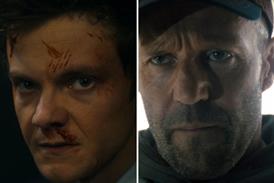Dir: Miwa Nishikawa. Jap.2006. 119mins.
Japanese film-maker Miwa Nishikawa may have beenmentored by acclaimed director's Hirokazu Kore-eda, but his latest feature, Sway, lacks the veteran's pacing and distinguished handling of drama.
A supposed thriller thatuses a seemingly accidental death to deal with the malaise afflicting aJapanese family, and through it Japanese society, it isdull and overlong viewing that will be of limited interest to festivals;commercial prospects are dim at best.
Takeru (Joe Odagiri), who left home many years ago and hasmade a name for himself as an art and fashion photographer in Tokyo, returnsfor the anniversary of his mother's death, one year after she died. At home, heis confronted by his violently authoritative father who accuses him of arrivingtoo late to honour the memory of his mother; Takeru counteraccuses his father about his violent conduct, and the two are only kept apartby Takeru's older brother, Minoru (Teruyuki Kagawa), who stayed home to run the familybusiness.
To celebrate their reunion,the two brothers, accompanied by Cheiko (Yoko Maki), afemale childhood friend, go hiking. While Takeru isphotographing the landscape, Minoru and Cheiko havean argument on a suspension bridge, during which she rejects his advances and fallsto her death.
For the rest of the film,first Minoru - who confesses he is guilty of the girl's death - and then thejustice system try to uncover what happened. Takeru,the only possible witness, claims he saw and heard nothing.
The film's overall premise isquickly evident. Takeru, the younger brother, isbitterly envied by all, making money and enjoying life, while Minoru is stuck backat home to endure old fashioned traditions, an over-bearing father and ademeaning livelihood. His humiliation is completed through his rejection by Cheiko, who obviously prefers the freedom and glamour ofthe big city represented by Takeru. The elder brother'sanger and spite, restrained by society's strict rules of courtesy, explode soonafter the incident, when Minoru rejects his younger sibling's help.
Miwa Nishikawa lays out the barebones of the conflict in the first act, and the script's insistence on diggingfurther into the details of the accident for unclear reasons leads the audiencenowhere; the final explanation serves more a metaphorical purpose than any dramaticone.
Photography is judicious butless adept than one might expect from a film which features a photographer asone of its protagonists. Acting is dutiful but hardly inspired acting; most ofthe interest can only be found in a montage scene staged during the trialscenes.
Production companies
Engine Films
Bandai Visual Co
Eisei Gekijo Co
International sales
Celluloid Dreams
Executive producers
Kazumi Kawashiro
Yutaka Shigenobu
Shoji Yakigaya
Producer
Kiichi Kumagai
Screenplay
Miwa Nishikawa
Cinematography
Takase Hiroshi
Editor
Miyajima Ryuji
Production design
Keiko Mitsumatsu
Music
Cauliflowers
Main cast
Joe Odagiri
Teruyuki Kagawa
Masatoh Ibu
Hirofumi Arai
Yoko Maki



















No comments yet